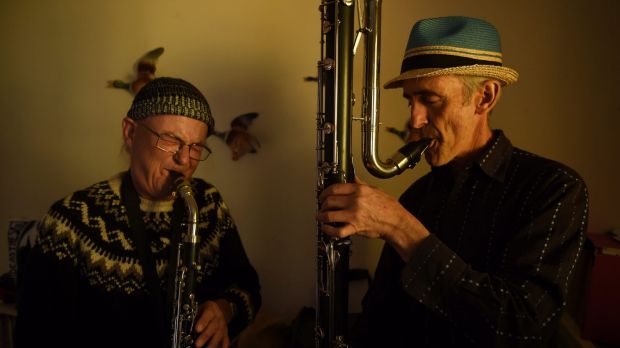
What is the Monday Club, a group of improvisers with a penchant for using long, slow notes as musical building blocks, doing in the Sydney Sacred Music Festival? The answer lies both in the broader meaning of “sacred” and in the story of the group’s founder, Tony Gorman. A brilliant saxophonist and clarinettist, Gorman was diagnosed with multiple sclerosis 20 years ago. This left him with numbness in his legs, hands and half his face, making playing a monumental challenge.
“I got out of bed one morning and I fell flat on my face,” he recalls. “I couldn’t feel anything from the waist down.” For many years he had to inject himself with Betaferon which initially had horrendous side-effects. “I met people who did it once and just said, ‘No, I’d rather die,'” says Gorman, who persisted. “I’m glad I went through it, because I’m sure it’s one of the main reasons I’m actually on my feet today.”
Now on a drug that comes in pill form, he faces each day with some assurance of the relative stability of his still-debilitating symptoms – and of his ability to play. Originally a multi-instrumentalist, these days he concentrates on alto clarinet, which (besides suiting him range-wise) allows his fingers a little technical latitude.
“As soon as I close my eyes and play a long note, everything in my body calms down,” he says. “Every molecule. My nervous system, even without the MS, just twitters like a sparrow. I’ve got a very high energy level, and the long notes are the ultimate antidote, because you cannot play them unless you don’t move a muscle.”
In his first two years at high school near Glasgow Gorman received an “F” in music because he refused to join the choir. “I’m a Scottish working-class boy, and just thought it was a bit sissy,” he says. “So my teacher always said I had no interest in music.”
In fact he was badgering his father for a saxophone, and its arrival when he was 14 paved a life path for him. “I was at that age,” he says, “with no interests, in an industrial town with nothing but alcohol, fights in the street and snooker halls. This was my way out.”
He attended the Royal Scottish Academy of Music and Drama, and by 19 had two diplomas and was playing in rock and jazz bands, as well as with the Scottish Chamber Orchestra and with conductor Richard Hickox (who later became Opera Australia’s Music Director). At 21, torn between pursuing classical or jazz, he presented his dilemma to Hickox. “He wasn’t much older than me, but he talked as if he was a pompous conductor from the ’30s,” says Gorman, doing an imitation: “‘I think you should pursue the classical.’ And that’s what decided me to do jazz!”
In 1986 he met and subsequently married the eminent Australian saxophonist Sandy Evans, moved to Sydney with her and co-led or played in such acclaimed projects as Clarion Fracture Zone, GEST8 and Mara!. His career was peaking just before the MS struck.
Gorman’s story is the subject of Shanni Dalton’s film No Boundaries, which premieres before the Monday Club’s festival performance. She describes a sequence in which Gorman has been playing long, deep notes: “When he finishes the piece he looks up, and I think that you sense how the music affects him. It just restores balance, peace, harmony and quietness. And I think that’s what he thinks is sacred.”